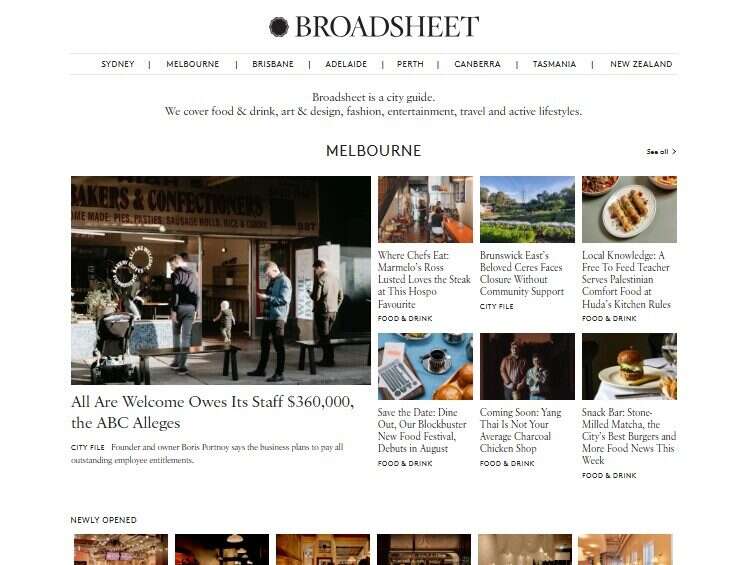
Founder of culture and city guide Broadsheet Nick Shelton told Press Gazette why the title is expanding from Australia and New Zealand into London.
It currently has 85 staff based across Australia and begins its conquest of the London cultural media scene with a team of five later this year.
The publisher guides readers how best to enjoy each city it is based in, with content spread across food and drink, fashion, travel, entertainment and art and design.
“What we expect to see in London is going to be different, and it’s going to merge over time,” Shelton told Press Gazette, adding the team doesn’t have “fixed views” on what this looks like, but as an example, more fashion and theatre coverage “because the West End is so strong”.
A website is scheduled for lunch in September, with a quarterly print edition to follow: “And we’ll lift to monthly if there’s an appetite for that”, Shelton said.
London editor Sonya Barber, a former Condé Nast Traveller editor and Time Out writer, will lead the editorial with Paul Davison (formerly a VP at Vice) as commercial director, plus Che-Marie Trigg as the outlet’s London commissioning editor.
Broadsheet’s business model
Broadsheet doesn’t receive money for covering businesses, but integrated partnerships and branded content is the “bulk of the revenue”. In Australia, Broadsheet has distribution partnerships with Ooh! and The Guardian. Advertising clients include: Mastercard, Disney, Square and Diageo.
“Our commercial strategy is to work with brand advertisers to build highly integrated content campaigns across platforms, as well as through activations and events. We’ve got a good business model in that we have never raised money.”
Its print magazine will be distributed for free and the website will prioritise reader experience over volume of advertising.
“Sites that are covered in ads and pop-ups make the reading experience terrible. You can make a few more bucks that way, but that’s not long term value creation. It’s about reinvesting profit margin and cash flow into growth, and then creating a delightful experience for readers and driving results for advertisers.”
In time, Broadsheet is keen to bring events to London to generate revenue, such as its dinner series, which involves hosting exclusive reader dinners at restaurants before they have opened.
The Australian model includes paid membership, “but we’re not doing this model yet until there’s a bit of maturity with audience volume”.
When asked if any platforms are particularly successful in generating revenue, Shelton pointed towards Broadsheet’s newsletter, with its “subscribers more engaged than a Google fly-by-night reader”.
While the Evening Standard and Time Out have pulled back on print distribution, they still provide extensive online coverage of London. There are also various newsletters such as Vittles, The Fence’s new Capital Letter and Cheapskate.
But Shelton says there is a gap in London’s cultural coverage which Broadsheet can fill: “Other culture publishers are strong on evergreen listings content, or it’s national newspapers doing weekend supplements. We sort of play this role in between – a focused go-to on culture. The audience, the journalism industry and the advertising industry tell us this doesn’t exist, so we’re confident.”
Broadsheet is blocking AI
One major focus of Broadsheet is “optimising an audience it can control”, shared Shelton, referencing the growing challenge of generative AI companies stealing publisher content and traffic.
He said Broadsheet has taken measures to block AI crawlers other than Google.
As far as Google goes, he said Broadsheet has no option other than to allow its content to be summarised in Google AI summaries: “They’ve given us this unenviable decision of opting out of search or showing to their audience without any clicks back to us. Then how do we generate revenue to generate content? It’s an abuse of their market power.”
He added: “We’ll build AI-powered chat functionality so people can explore our site using the power of AI. Our strategy is that people come to us for that curation rather than ChatGPT.”
Europe is next
Further expansion is on the cards for Broadsheet, Shelton said: “If it works out, we can look at replicating the model in Europe – it applies to every great city”.
Broadsheet aims to chase revenue “in honest ways that support the advertiser and the audience”, and expand from there.
“There’s a huge amount of headroom in terms of our potential growth. But the first focus is just getting London right.”
Email pged@pressgazette.co.uk to point out mistakes, provide story tips or send in a letter for publication on our "Letters Page" blog
